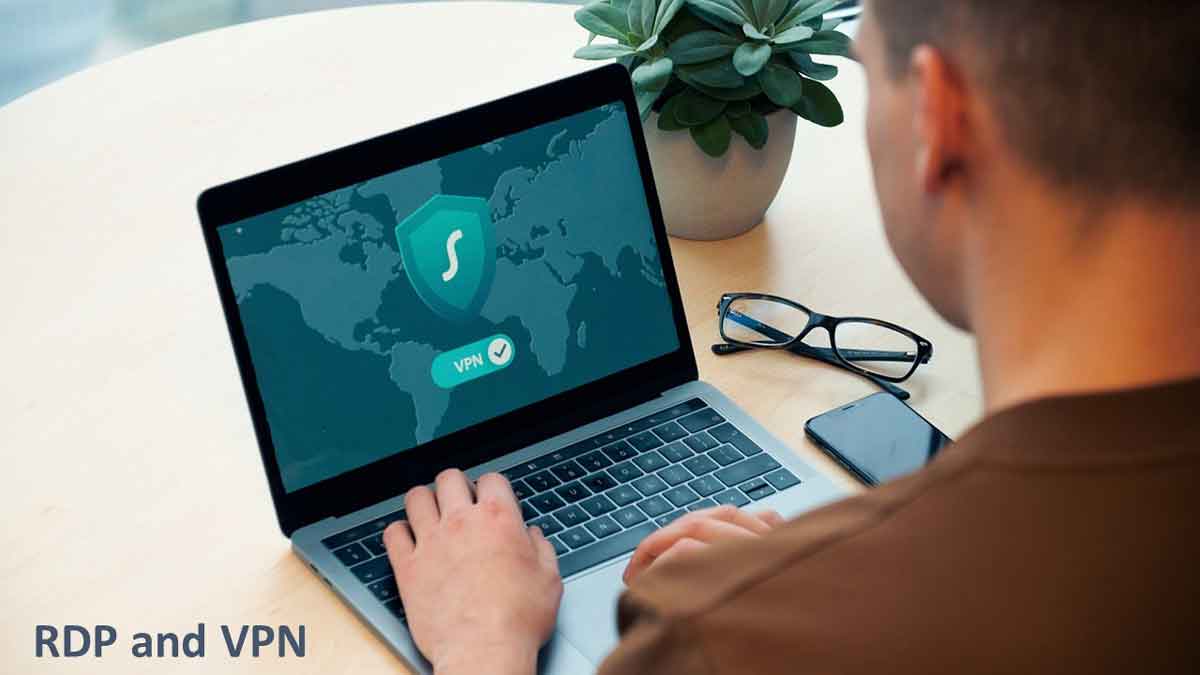RDP and VPN

VPN and RDP (Remote Desktop Protocol) are two common technologies for remote access that are widely used today. Many users always face the question, what is the difference between RDP and VPN? This question is usually created because of the similar functionality that these two technologies provide in remote access, and they make mistakes in understanding the difference between RDP and VPN.
To better understand the difference between RDP and VPN, you must first answer the question, what is the function of RDP and VPN? What are these two technologies used for? After you get familiar with VPN and RDP, you will realize that these two technologies have completely different natures and capabilities, and each one is used to solve different problems.
You will also find that RDP and VPN have fundamental differences from each other, that their distinguishing features complement each other’s performance instead of competing. In this article, we will discuss their differences in detail. If you want to know the difference between RDP and VPN, read our article to the end.
What is RDP?
Remote Desktop Protocol (RDP) is a proprietary protocol and technical standard for remote access to your computer’s desktop from another device. RDP through the internet and from anywhere in the world makes it possible to share the desktop screen and programs, access specific files stored on the local computer, even set up and launch programs, and perform any tasks as if you were sitting in front of your computer desktop.
RDP performs its function using Remote Desktop Services and Remote Desktop Protocol Broker. The RDP solution goes beyond remote access to your computer. You can experience a secure connection besides managing your computer desktop from anywhere in the world. Recently, the use of RDP has expanded with the adoption and popularization of remote work in many businesses.
RDP offers many advantages for businesses and IT professionals. For this reason, recently, businesses have been the main users of RDP services, which makes it a priority to Buy RDP to provide a suitable platform for remote employees. IT professionals and remote employees will be able to easily access their servers and computer desktops from anywhere in the world without the need to be physically present in their offices using the RDP service. One of the best advantages of RDP is that it provides complete access to perform tasks locally on the network.
Besides businesses, the RDP solution is also helpful for technicians, making it easy for technicians to repair old hardware and transfer data from an old computer to a new computer.
What is a VPN?
So far, you have understood what RDP is and what it is used for. Now it is time to understand the function of VPN, which stands for Virtual Private Network. As the name suggests, VPN extends a private network over the public network (Internet) to maintain privacy and security.
VPN is a complex technology that, unlike RDP, which remotely increases the rights of people outside the network, VPN prevents outsiders from infiltrating your system’s database by controlling access, to keep communications secure. VPN keeps users’ connection to the Internet secure through security measures and encryption tunnels (usually TLS/SSL). Also, It makes your internet browsing safe and private by controlling your incoming and outgoing online traffic (including your requests and responses from websites and files being transferred).
Therefore, the purpose of a VPN is to provide security in connecting to the public network, which to reach its goal, hides the identity, IP address of your system, and your online behavior and provides other necessary measures to protect your privacy.
RDP Vs VPN
With the explanations we gave about the purposes of RDP and VPN, you now understand the difference in their performance better. RDP is a service that provides remote access to the host computer through the client computer, while VPN secures access to the public network (Internet).
Compared to VPN, RDP offers more features and functions. By using RDP, you can have complete control over the remote computer and network, which is impossible through a VPN. Therefore, it can be concluded that RDP offers more flexibility and control Than VPN, which only allows secure access to the public network.
Security is the most important factor in remote access to a network or device because access to important information from an external source is associated with security risks. You may ask yourself which one is more secure, VPN or RDP, In response, we say that VPN is superior to RDP in terms of security by using security technologies and data encryption tunnels, and privacy protection is one of the prominent advantages of VPN, of course, provided that it uses strong encryption.
RDP also offers features such as session monitoring, and IP address change to improve security in remote communication. Perhaps against the progress of cyber attacks and hackers, each of the solutions alone is not enough. For this reason, the best method for remote connection security is to use RDP and VPN in combination.
Conclusion
Understanding the difference between RDP and VPN can guide you in using these services. You consider that each person and organization has different technical needs. If you are looking for a solution for complete and flexible access with complete remote control to your computer desktop, RDP can meet your needs in the best way.
Businesses use RDP services to enable third parties and employees to remotely access office computers to perform their duties. Besides providing access, RDP services are also useful for technical support, troubleshooting, and higher productivity.
But if you are looking for a solution to access secure networks and security and privacy protection in your internet connection is your goal, VPN is the best option. To enhance the security of the Internet connection, VPN hides your original IP address and online behavior while browsing. It also encrypts data sent and received when connecting to the Internet, even allowing access to geographically restricted content.
Companies usually come to VPNs to protect corporate networks and control access to databases. We recommend you can benefit from both services together, which is the best method for remote access, but consider your needs and goals and choose the best service based on your wishes.
